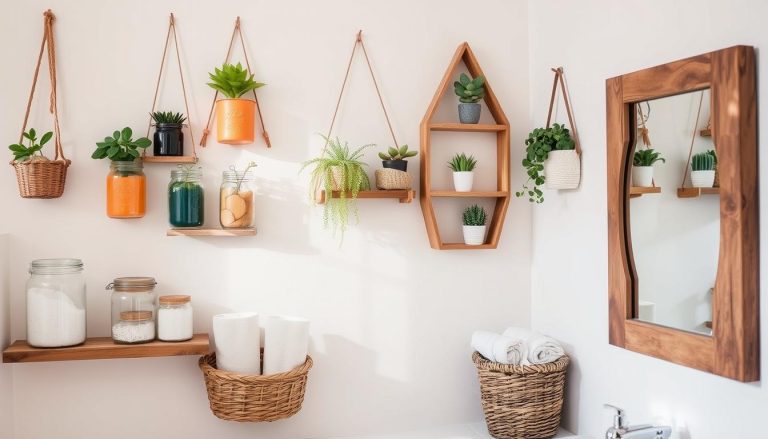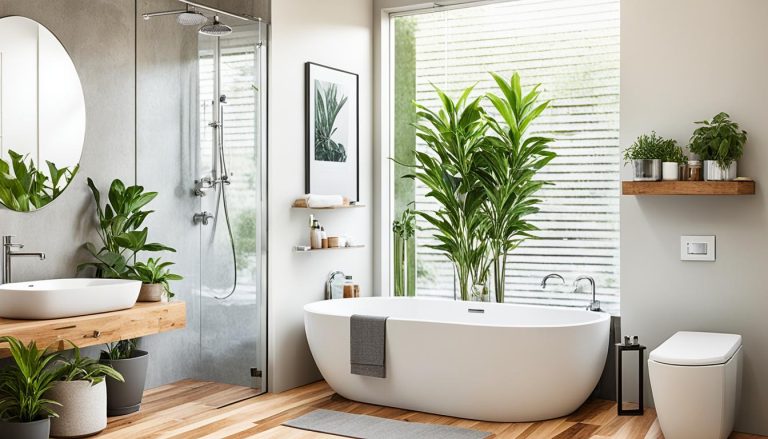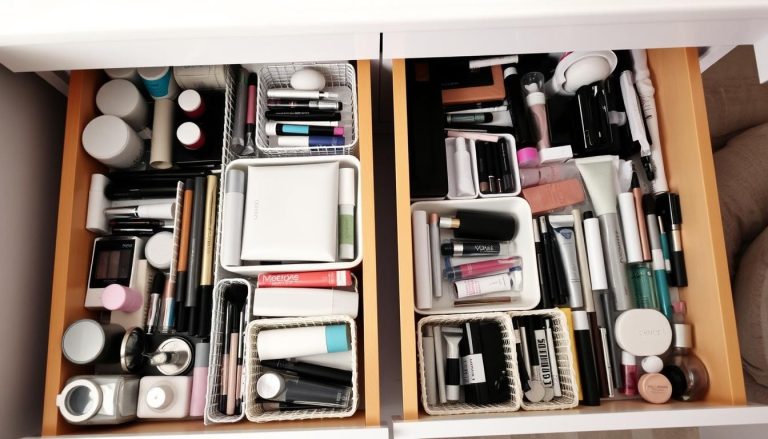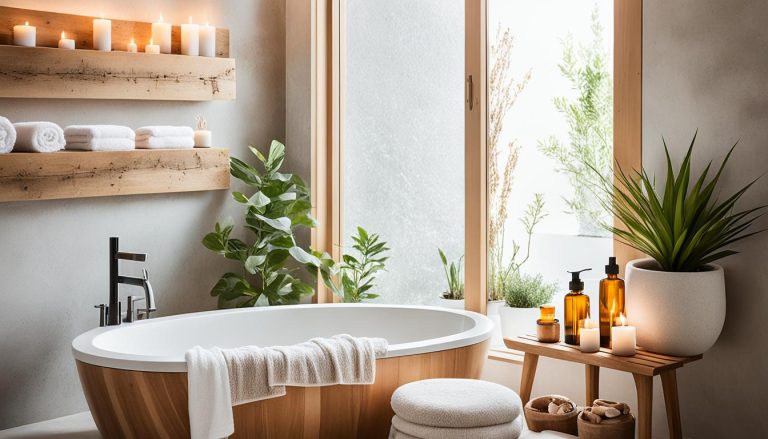Key Tips for Effective Under-Sink Storage: Maximize Your Space
houseremodelingnews.com may earn a commission if you purchase a product through one of our links
Did you know 70% of homes struggle with kitchen organization? The under-sink area often turns into a mess. But, with the right strategies, you can make it efficient.
Let’s look at some interesting facts. Adding under-sink organizers takes just a few minutes. Yet, it makes a big difference in space. Clear bins and two-tier shelving with drawers are great for organizing.
Interestingly, 80% of homes keep cleaning supplies under the sink. This shows how crucial good storage is in this area. Smart storage not only declutters but also makes things easier to find.
Are you ready to change your under-sink space? Let’s discover key tips to make the most of this often-neglected area. It will improve your kitchen’s function and your calm.
Key Takeaways
- 70% of homes struggle with kitchen organization
- Installing under-sink organizers takes only minutes
- Clear stackable bins maximize vertical space effectively
- Two-tier shelving with pull-out drawers is popular for cleaning supplies
- 80% of households store cleaning supplies under the kitchen sink
- Smart organization improves accessibility and declutters the space
Understanding the Challenges of Under-Sink Storage
Under-sink storage can be a big problem for homeowners. This often-overlooked area has unique challenges that make organizing tough. Let’s look at the common issues and why it’s important to organize well.
Common Issues with Under-Sink Spaces
Under-sink areas are tricky because of their layout. Plumbing, outlets, and odd shapes make it hard to use the space right. Many struggle with wasted space and finding things at the back.
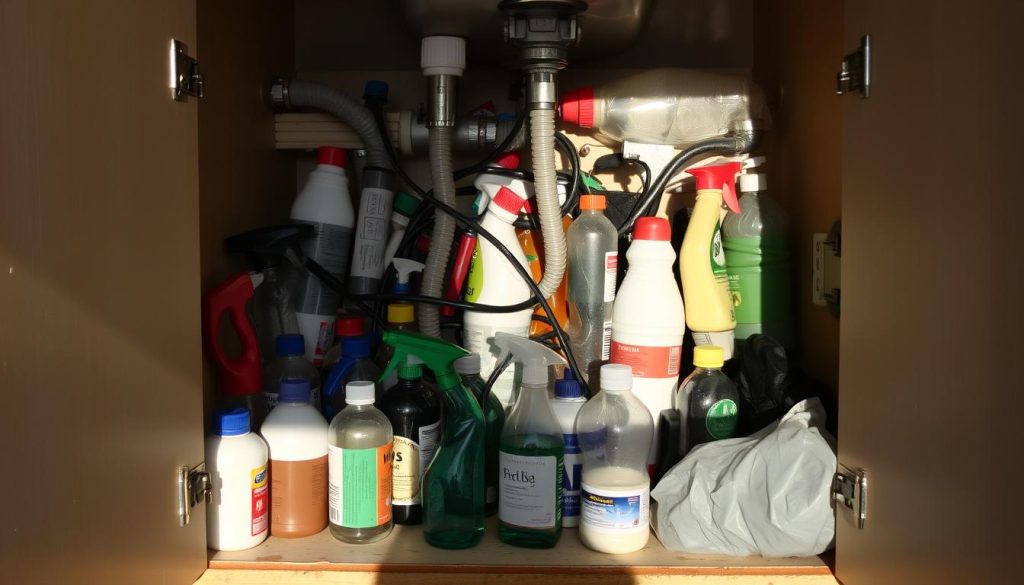
Importance of Proper Organization
Organizing under-sink areas is crucial for better storage. Smart hacks can turn this messy space into a useful spot. Experts say to declutter often and sort items for easy reach.
Impact on Kitchen Efficiency
A tidy under-sink area makes your kitchen work better. Using pull-out trays or modular systems can save space and time. This makes daily tasks easier and more fun.
| Storage Solution | Benefits |
|---|---|
| Clear bins | Improved visibility |
| Turntables | Easy access to items |
| Stackable organizers | Maximize vertical space |
| Labeled containers | Quick item identification |
By tackling these under-sink problems and using smart hacks, you can make your kitchen more efficient and functional.
Assessing Your Under-Sink Storage Needs
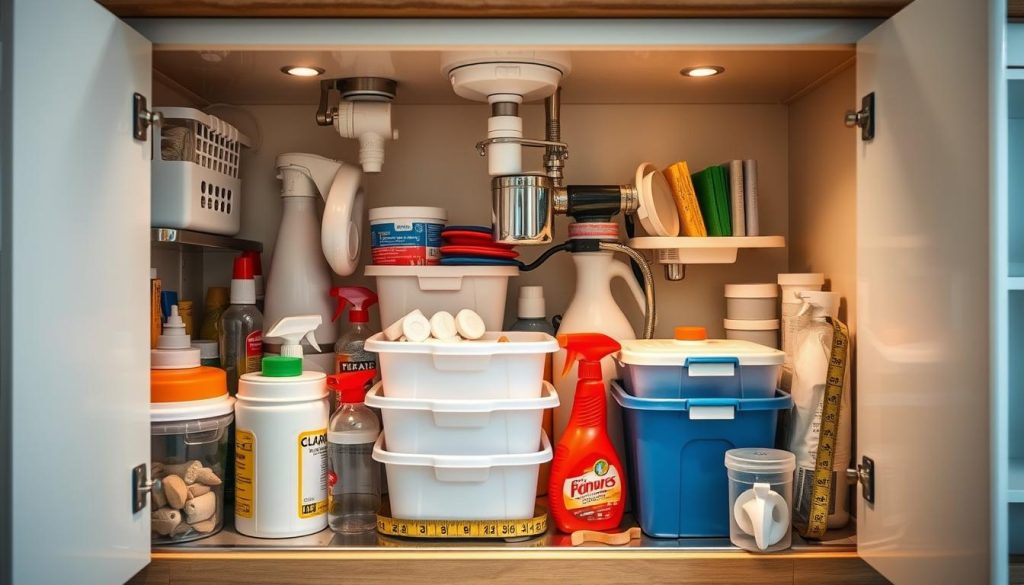
Start by emptying and cleaning your under-sink cabinet. This is the first step in finding the right kitchen storage solutions. It lets you see the full potential of your space.
Sort your items into groups like cleaning supplies, dental care, and beauty products. This helps you understand what you have and what storage you need. Also, check expiration dates and get rid of old items. It’s important for decluttering your cabinet.
Measure your cabinet space, noting any pipes or fixtures that might limit your storage. Use clear, labeled containers to keep things organized and easy to find. These containers also protect your cabinet from spills.
- Remove everything and clean the space
- Sort items into categories
- Discard expired products
- Measure available space
- Choose appropriate storage containers
Think about how often you use each item. Put frequently used products in easy-to-reach spots. Store less used items in harder-to-reach areas or elsewhere.
By doing a detailed under-sink storage assessment, you’ll be ready to pick the best kitchen storage solutions. This step is key to a well-organized and efficient under-sink space.
Decluttering: The First Step to Effective Storage
Start your under-sink decluttering journey with these tips. A clean space is essential for better storage and a calm environment. In fact, 61.7% of people feel less stressed after decluttering their homes.
Purging Expired Products
First, empty your under-sink cabinet. Check the expiration dates of all items and toss the expired ones. This simple step can clear a lot of space and keep you safe from health risks.
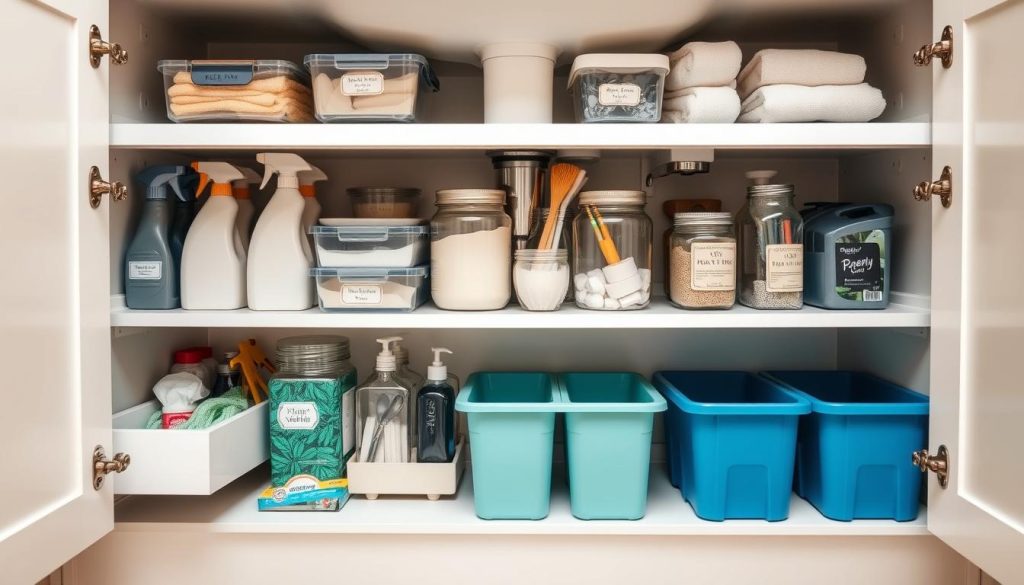
Donating Unused Items
Go through your items and pick out those that are still good but you no longer need. Donating them helps others and declutters your space. Remember, 75% of Americans have decluttered in the last year – you’re in good company!
Relocating Misplaced Items
Find items that don’t belong under the sink and put them back where they belong. This is a key step in decluttering and organizing. By following these tips, you’ll make your under-sink area more efficient.
“Edit and purge your cabinets once a year to account for changing preferences and expired products.”
With these strategies, you can make your under-sink area better in about 45 minutes. Keep up with maintenance to keep your space organized and useful.
Measuring Your Under-Sink Space
Getting the right measurements for your under-sink area is key. Start by emptying your cabinet. This lets you see everything and find forgotten items.
Accounting for Plumbing Fixtures
Remember the pipes and garbage disposal when measuring. They take up space. Use a tape measure to get the width, height, and depth of your cabinet. Note any obstructions to pick the right storage.
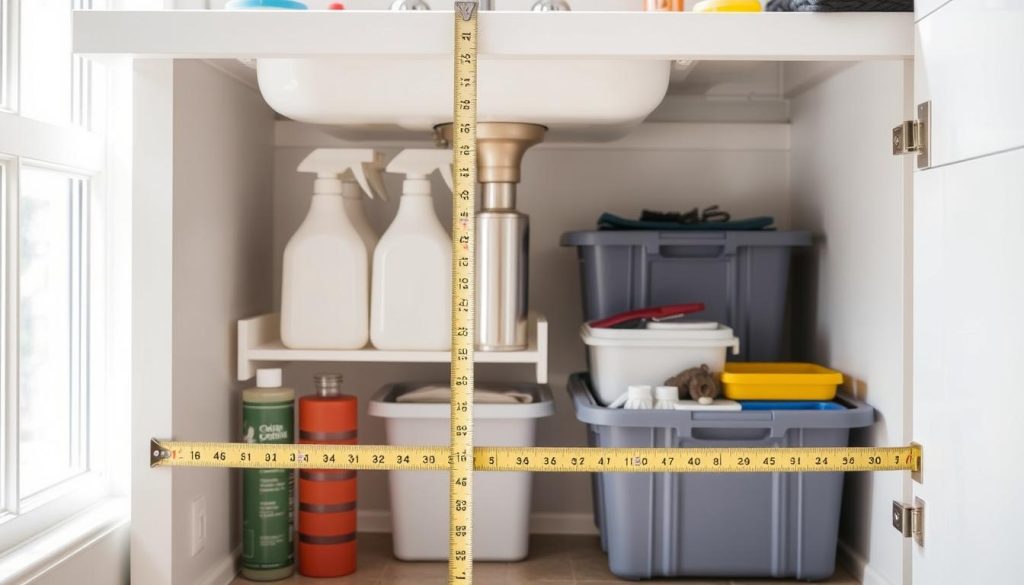
Considering Door Opening Clearance
Your cabinet doors matter a lot. Measure the door opening to make sure new storage fits. You need to be able to reach your supplies easily.
By measuring carefully, you’re ready to pick the best organizers. They’ll fit perfectly, making the most of your space. This will turn your messy under-sink area into a neat, efficient spot.
| Measurement | Importance |
|---|---|
| Width | Determines horizontal space for organizers |
| Height | Influences vertical storage options |
| Depth | Affects choice of pull-out or stationary organizers |
| Door clearance | Ensures easy access and proper closing |
Selecting the Right Storage Solutions
Choosing the right under-sink storage can make a big difference. Pull-out drawers make it easy to reach items in the back. Stackable containers and over-the-door organizers help use every inch of space. Make sure to pick water-resistant materials to protect against leaks.
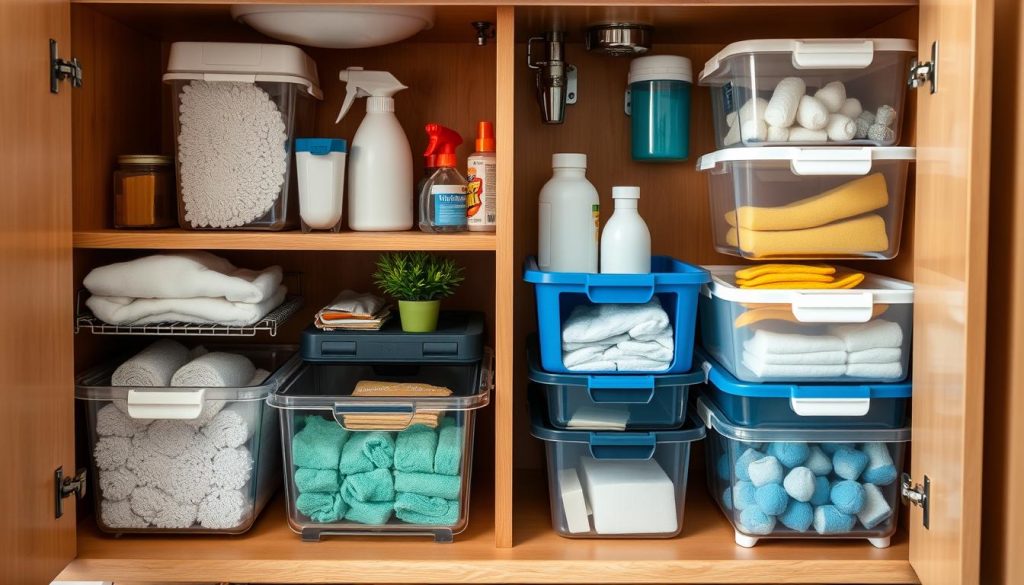
Expandable shelves fit around plumbing, adapting to your space. Jamie Hord suggests pulling everything out to see what you need. This helps group similar items and decide what to keep.
“Create zones in your kitchen based on daily routines and place items near where they’re used most,” advises Marissa Hagmeyer, co-founder of Neat Method.
Good under-sink storage makes your kitchen more efficient. Use clear containers and label everything. This way, you can find what you need fast, saving time and stress.
| Storage Solution | Benefits | Best For |
|---|---|---|
| Pull-out drawers | Easy access to back items | Deep cabinets |
| Stackable containers | Maximize vertical space | Small items, cleaning supplies |
| Over-the-door organizers | Utilize door space | Spray bottles, sponges |
| Expandable shelves | Adapt to plumbing | Oddly shaped spaces |
By choosing the right under-sink organizers and following these tips, you’ll have a storage system that works for you.
Maximizing Vertical Space with Tiered Organizers
Make the most of your under-sink area with vertical storage solutions. These smart organizers turn cluttered spaces into efficient storage hubs. Let’s explore some top-notch options to maximize your vertical space.
Pull-out Drawer Systems
Pull-out drawer systems are game-changers for under-sink shelving systems. They slide out smoothly, giving you easy access to items tucked away at the back. No more digging through a jumble of cleaning supplies!
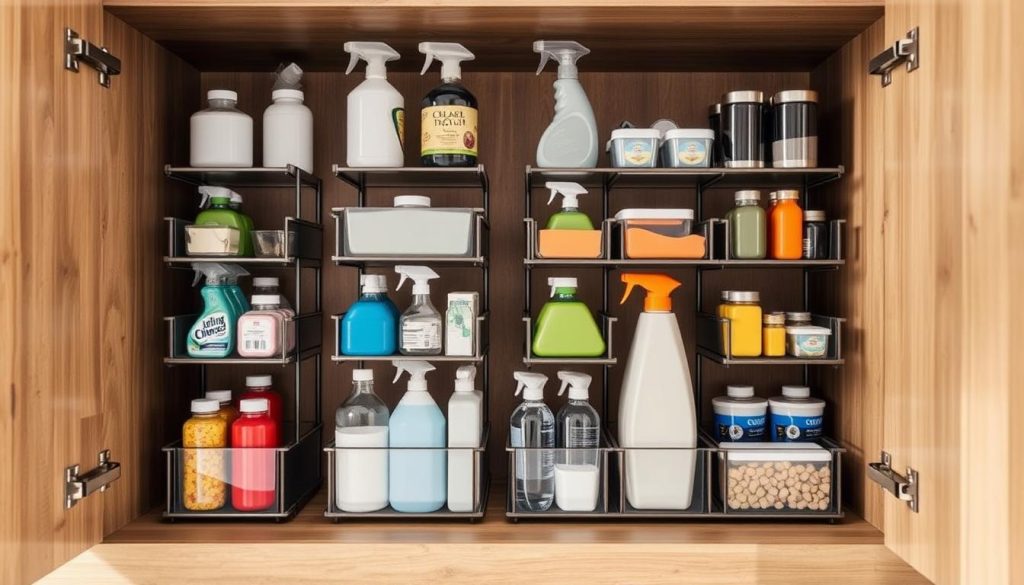
Stackable Containers
Stackable containers are perfect for storing small items like sponges and dishwasher tablets. They make great use of vertical space and keep everything neat and tidy. Plus, clear containers let you see what’s inside at a glance.
Over-the-Door Organizers
Over-the-door organizers are often overlooked but incredibly useful. They’re ideal for holding frequently used items, making them easy to grab when you need them. This type of under-sink caddy organization frees up valuable shelf space.
| Organizer Type | Price Range | Best For |
|---|---|---|
| Pull-out Drawer System | $30 – $100 | Large items, cleaning supplies |
| Stackable Containers | $15 – $50 | Small items, sponges, tablets |
| Over-the-Door Organizer | $12 – $40 | Frequently used items |
By combining these vertical storage solutions, you can transform your under-sink area into a well-organized space. Remember, the key is to use every inch of vertical space available. With the right under-sink shelving systems, you’ll wonder how you ever managed without them!
Creating Zones for Different Categories
Organizing your under-sink space into zones can change your kitchen. It makes daily tasks easier and more efficient. Let’s look at some ways to organize your items well.
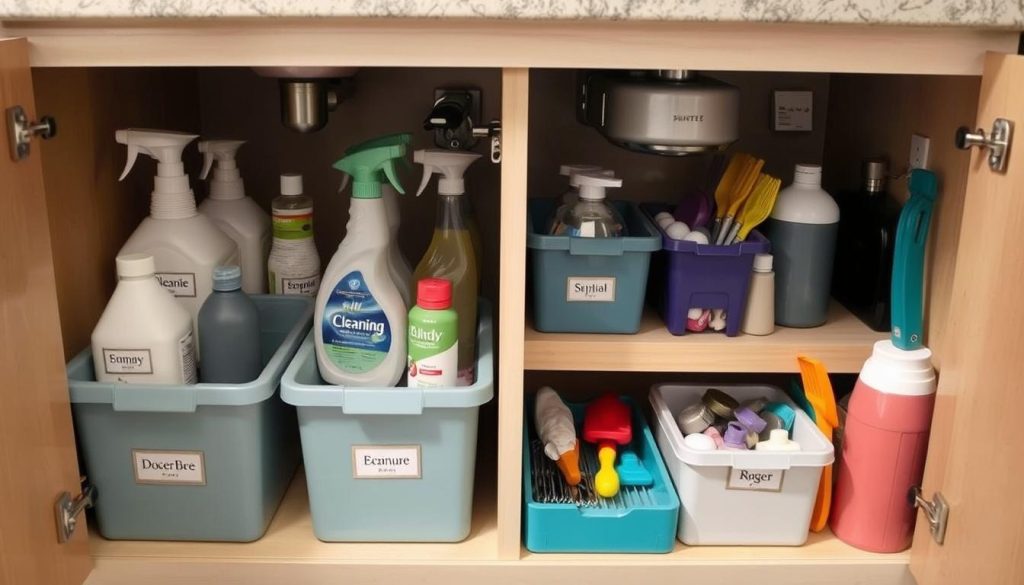
- Cleaning supplies
- Dish-washing items
- Recycling and trash
- Plumbing tools
- Everyday essentials
- Specialty products
Use clear containers to group similar items in each zone. This helps you find what you need fast. For cleaning supplies, a pull-out drawer system is great for saving space. Keep dish-washing items near the front for easy access.
Set up a recycling system with stackable bins for different materials. Store plumbing tools in a small toolbox that’s easy to move. Place everyday essentials like sponges and dish soap in a caddy for quick access.
| Zone | Storage Solution | IKEA Product | Price |
|---|---|---|---|
| Cleaning Supplies | Pull-out drawer | VARIERA shelf insert | $12 |
| Dish-washing Items | Caddy | VARIERA box | $4 |
| Recycling | Stackable bins | HÅLLBAR recycling holder | $15 |
| Plumbing Tools | Toolbox | SKÅDIS container | $6 |
By using these storage hacks and setting up zones, you’ll turn your cluttered under-sink area into a well-organized space. This will make your kitchen more functional.
Under-Sink Organization: Dos and Don’ts
Learning how to organize under your sink can change your kitchen. We’ll look at some key tips to help you use your space better and keep things neat.
Use Clear Containers for Visibility
Clear containers are a big help for organizing under your sink. They let you see what’s inside without having to dig through. Choose bins with handles for easy carrying of cleaning supplies.
Avoid Overcrowding
One key rule is to not overcrowd your under-sink area. Make sure there’s room for everything. This makes it easier to find what you need and prevents things from falling over.
Label Everything Clearly
It’s important to label everything clearly. Use waterproof labels to mark containers and areas. This simple step helps keep your under-sink area organized and makes it easier for everyone to find what they need.
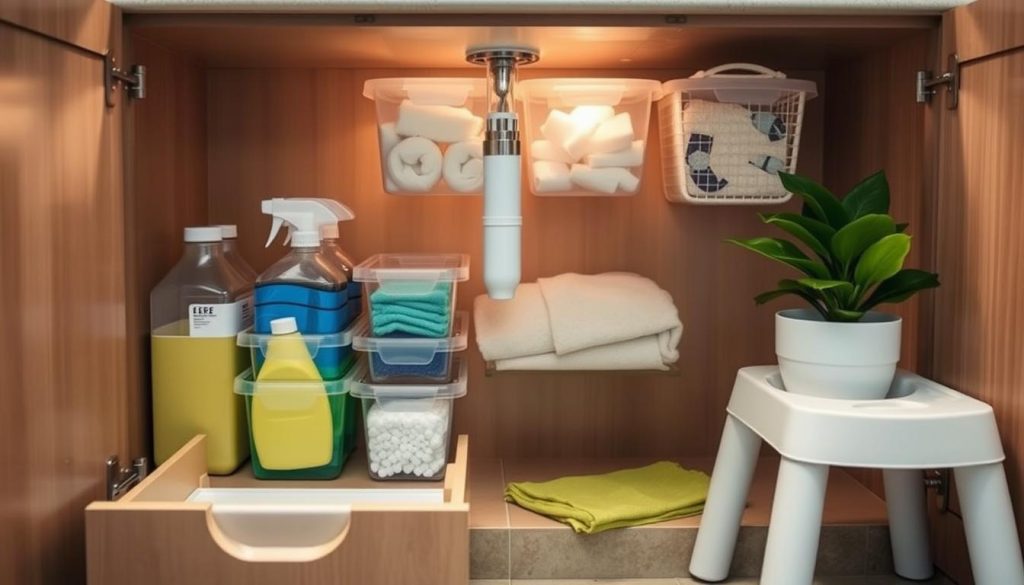
| Do | Don’t |
|---|---|
| Use clear containers | Store flammable products |
| Label everything | Keep food containers |
| Use vertical storage | Store batteries |
| Implement pull-out drawers | Keep make-up products |
Good under-sink storage is about making smart choices. Don’t store things like onions, potatoes, or sponges there because it’s too damp. Instead, focus on creating a space that meets your daily needs.
Incorporating Lazy Susans for Easy Access
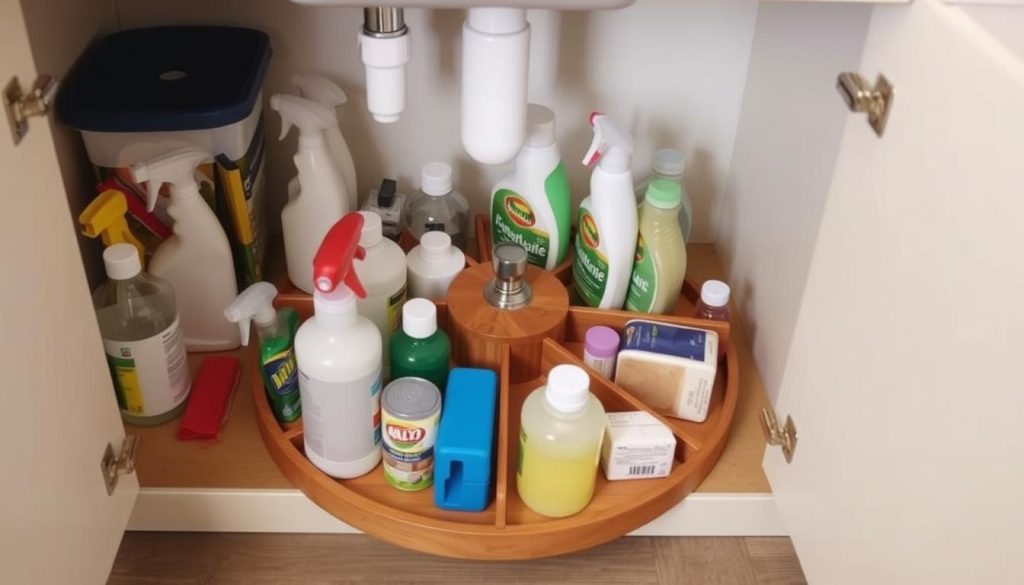
Lazy Susans are a big help for under-sink storage. They make the most of your space, especially in tricky corners. By spinning items around, you’ll easily find what you need without a mess.
Adding a lazy Susan under your kitchen sink boosts storage. Swap out big containers for clear drawers on the platform. This way, you can store more while keeping things easy to see and grab.
To get the most out of your lazy Susan, try these tips:
- Use the space behind the lazy Susan for paper towel rolls
- Place dishwashing pans strategically around the edges
- Add cabinet liners to keep your lazy Susan clean
- Rotate stored items regularly for better visibility
For more under-sink space, think about a multi-tiered lazy Susan. It uses vertical space well, letting you store more without losing organization. Group similar items on each level for quick access to all your under-sink needs.
The secret to good lazy Susan under-sink storage is balance. Don’t overload your organizers. Keep them light so they spin easily, making it simple to find what you need.
Utilizing Command Hooks for Hanging Storage
Command hooks are a game-changer for under-sink storage. They use vertical space to keep cleaning supplies organized and within reach. Let’s see how to use command hooks to organize your under-sink area.
Hanging Cleaning Tools
Turn your cabinet doors into storage spaces. Attach command hooks to hang brushes, dusters, and more. This keeps items off the floor, saving space and making things easier to find.
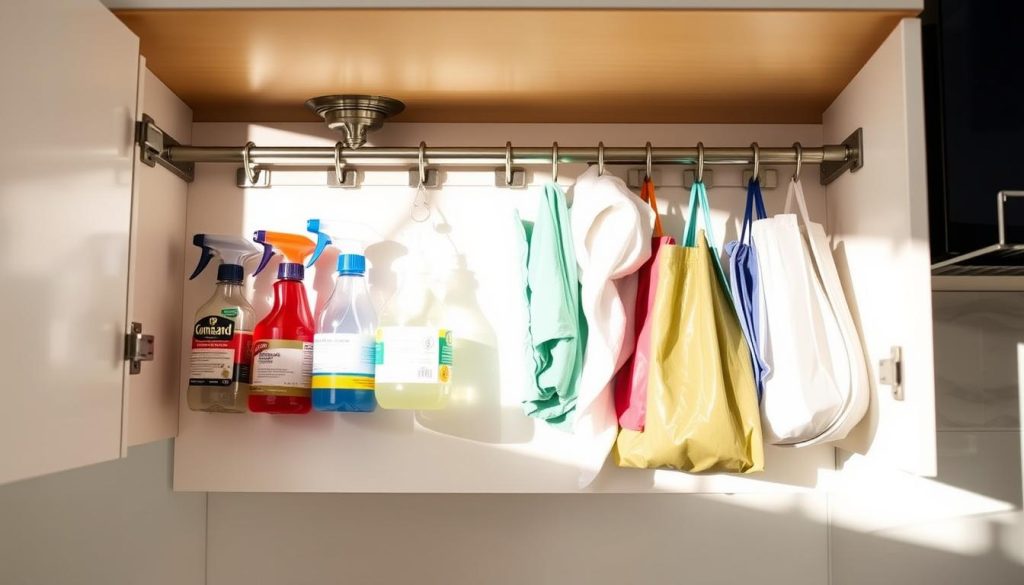
Organizing Spray Bottles
Command hooks are great for storing cleaning supplies under the sink. Install hooks on the back wall to hang spray bottles. This keeps them upright, preventing spills and saving shelf space.
You can even set up a tiered system with hooks at different heights.
| Item | Recommended Hook Type | Weight Capacity |
|---|---|---|
| Spray Bottles | Medium Wire Hooks | 3 lbs |
| Cleaning Brushes | Small Wire Hooks | 1 lb |
| Dish Rags | Spring Clips | 0.5 lbs |
Remember, command hooks are easy to remove and won’t harm your cabinets. They’re ideal for renters or anyone who likes to change their storage setup often. With these simple solutions, you’ll wonder how you managed without them.
Protecting Your Cabinet with Shelf Liners
Under-sink shelf liners are a game-changer for cabinet protection. They keep your cabinets safe from moisture, spills, and daily wear. By using shelf liners, you protect your space and make cleaning easier.
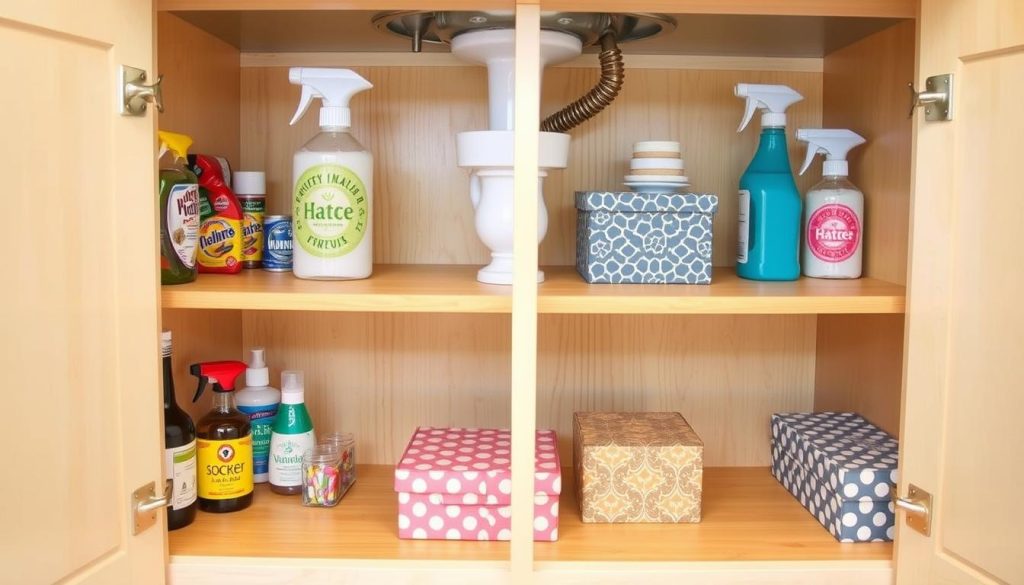
Start by measuring your cabinet floor. Cut the liner to fit around edges and plumbing using an X-acto knife. This ensures full coverage and effectiveness. The right liner can prevent scratches and protect your security deposit if you rent.
Choosing textured liners adds more functionality. They keep drawer organizers in place, stopping them from sliding. For wire shelving, solid surface liners are best, stopping dirt and fabric snags.
| Benefit | Impact |
|---|---|
| Moisture Protection | Prevents water damage |
| Easy Cleaning | Wipes clean quickly |
| Scratch Prevention | Guards against wear and tear |
| Organization Aid | Keeps items in place |
In bathrooms, use mold and mildew-resistant liners like Clorox Easy Liner. Two rolls usually cover a standard vanity. Add turntables and stacking bins for the best under-sink organization. These versatile protectors also work great in fridges, dish cabinets, and as drawing surfaces for kids!
Maintaining Plumbing Accessibility
Smart storage solutions are key to keeping your under-sink area organized. They ensure under-sink plumbing accessibility. By choosing the right organizers, you can maximize space and prevent leaks.
Choosing Organizers That Work Around Pipes
When selecting storage solutions for plumbing, opt for adjustable options that fit around pipes. U-shaped drawers are perfect for utilizing space around sink fixtures. Slide-out bins at the cabinet bottom improve access to areas blocked by plumbing.
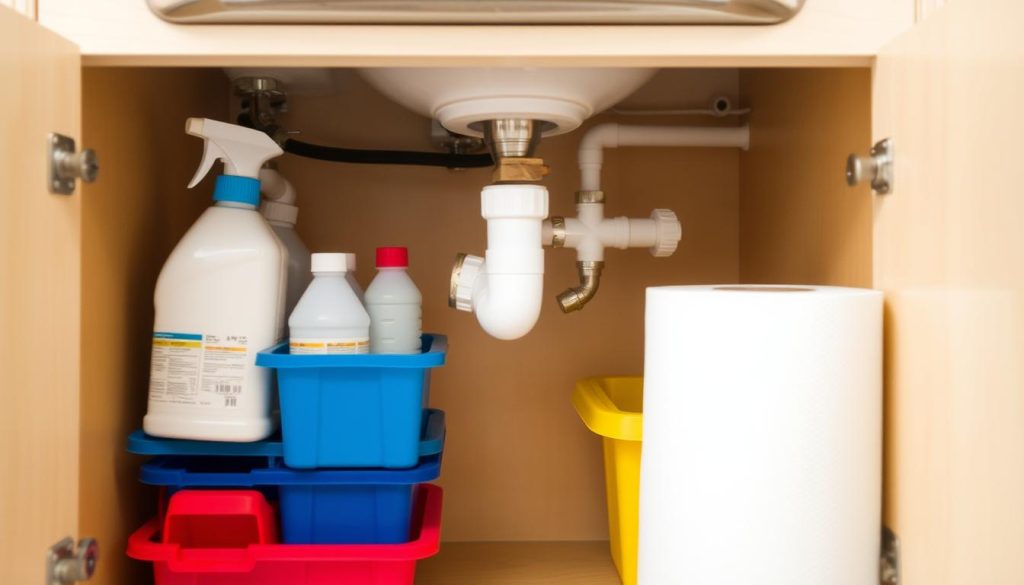
Ensuring Easy Access for Maintenance
To maintain under-sink plumbing accessibility, consider these tips:
- Use tension rods for versatile, removable storage
- Install sliding shelves for easy access without digging
- Add cabinet door bins for extra space
- Utilize lazy Susans to simplify reaching items
For under-sink leak prevention, line the cabinet bottom with a waterproof mat or liner. This protects the interior from water damage and makes cleanup easier.
| Storage Solution | Benefits | Best For |
|---|---|---|
| Stainless steel organizers | Durable in wet areas | Long-term use |
| Door-mounted storage | Cost-effective, promotes drying | Sponges, damp cloths |
| 2-tier sliding baskets | Efficient organization | Everyday items |
By implementing these storage solutions, you’ll maintain easy access to your plumbing. You’ll also keep your under-sink area tidy and functional.
Regular Maintenance and Reorganization
To keep your under-sink area tidy, you need to keep working at it. Regularly organizing your cabinets is crucial for a well-run kitchen. By sticking to a maintenance routine, you can avoid clutter and keep your space useful.
Make a plan to check your under-sink area regularly. During these times, throw away expired items, restock what you need, and update your organization system if it’s needed. This way, you’ll save time and avoid headaches later on.
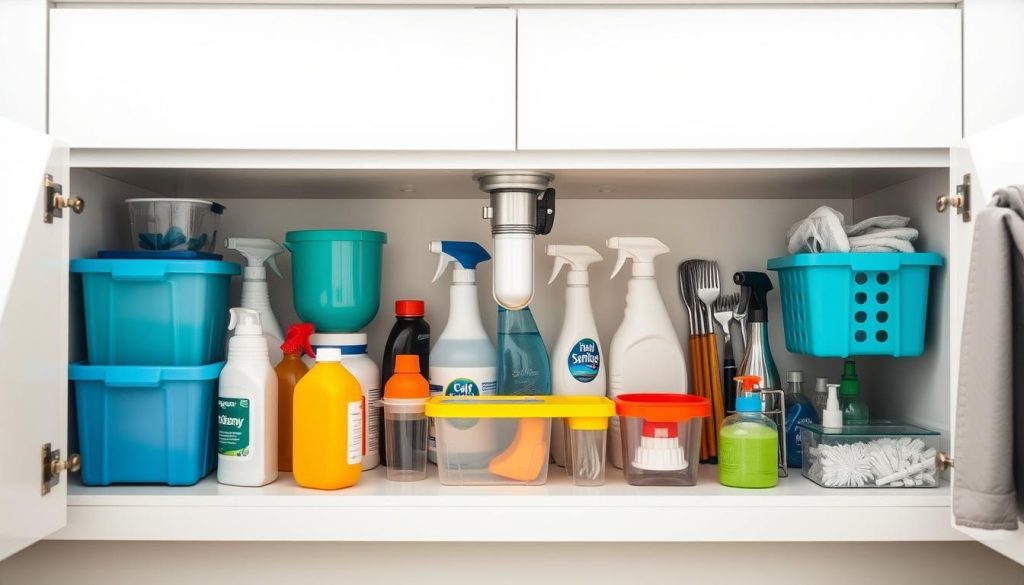
- Keep a declutter caddy handy with trash bags and donation bags
- Sort items into piles based on usage or group similar items together
- Use transparent, lidless bins for storing cleaning supplies
- Opt for square or rectangular containers to maximize space efficiency
- Add a moisture-resistant barrier to protect items from dampness
Experts say you should clean out your under-sink cabinets every year. This keeps your space organized and stops old or unused items from piling up.
| Maintenance Task | Frequency | Benefits |
|---|---|---|
| Discard expired products | Monthly | Prevents clutter, ensures safety |
| Restock essentials | As needed | Maintains efficiency |
| Adjust organization system | Quarterly | Optimizes space usage |
| Deep clean and reorganize | Annually | Refreshes entire space |
By following these tips, you can make your kitchen storage space more organized and efficient. It will stay that way for a long time.
Closing Thoughts
Effective under-sink storage is within your reach. By using smart kitchen organization tips, you can turn this often-overlooked space into a functional powerhouse. Remember, it’s not just about cramming everything in. It’s about creating a system that works for you.
Dollar Tree, Target’s Dollar Spot, and stores like Home Goods offer affordable storage solutions. These can help you start your organization journey. With seven key tips to reduce clutter, you’ll be well on your way to a tidier kitchen. Small changes, like keeping soap and sponges under the cabinet, can make a big impact.
Experts like Millie Hurst and Lucy Wahl stress the importance of decanting soaps into attractive containers. They also suggest setting up an organized under-sink space. Don’t forget to add practical items like dish towel hangers and faucet sponge holders. With these strategies, you’ll create a more efficient and enjoyable kitchen space.


